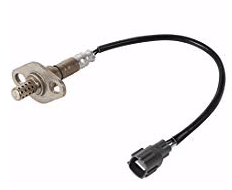P0161 is a very common OBDII code that occurs in the Ford Galaxy. It is typically caused by a failure in one of the elements that heat the oxygen sensors, specifically bank 2 sensor 2. Replacing the Oxygen sensor will fix the problem a majority of the time. Some of the other causes of P0161 are listed below.
The purpose of the heated element in the oxygen sensor is to quickly bring it up to normal operating temperature after your Galaxy has been started. When it goes bad, it is more difficult for the engine to get the air fuel mixture right.
Ford Galaxy P0161 Symptoms
Typically, the only symptom of P0161 is going to be the service engine soon light. It should not be considered a breakdown risk. But, like anything that causes the service engine soon light to come on it is a good idea to have it fixed as soon as possible.
P0161 Causes: Ford Galaxy
Here are the most common issues that cause the P0161 code in the Ford Galaxy. They are presented in order (somewhat) of most to least likely to cause the problem.

- Bad Oxygen Sensor– The oxygen sensor itself is one of the most likely reasons that P0161 is triggering your service engine soon light. Although it is a temptation to replace it right away, it wouldn’t hurt to check out the wiring harness around it beforehand. See directly below. They are relatively affordable at Autozone or Amazon.
- Wiring Harness Damage– The wiring that goes to the front and rear oxygen sensors is very susceptible to damage. This is due to the fact that O2 sensors are under the chassis where they are subject to punishment from road debris, and they are subjected to a lot of exhaust heat. The downstream sensor is especially susceptible to this problem Here’s how to find a short in the wiring harness (Youtube)
- Damage to the Terminal– The terminal that the oxygen sensor connects to (the plug) is also relatively susceptible to damage. You’ll want to make sure that there is voltage going to it. There’s more on that directly below.
- Blown Heater Sensor Circuit Fuse– Here’s how to test if a fuse is blown (Youtube).
- Wrong O2 Sensor– If you are getting P0161 after having recently replaced your Oxygen sensor, it may be that the replacement is wrong or bad.
Galaxy P0161 Diagnosis
Here is a fantastic video that covers all aspects of diagnosing a P0161 trouble code.
It is possible to diagnose the P0161 with a multimeter. If you use the multimeter, you’ll know whether or not the voltage coming to and from the oxygen sensor is within spec, this can help you determine if it’s your Galaxy’s O2 sensor, or wiring harness that’s the issue.
If you don’t have access to a multimeter, it certainly wouldn’t hurt to check the wiring to between the fuse box and the Oxygen sensor first. If it ends up being a wiring issue, it’ll save you money over buying an unnecessary O2 sensor.
You can also use a voltage test light to determine whether or not the oxygen sensor is getting any voltage at all (they’re about $5 at Walmart). If it’s not getting any voltage, attache the test light to the harness plug and shake the wiring a little bit. If the light comes on, even for a second, you know that you have a short circuit causing the P0161 trouble code.
Conclusion
Most of the time with P0161, it’s going to be the oxygen sensor itself that has caused the code to trigger. Good luck finding whatever caused it in your Ford Galaxy. If you have anything that you would like to add, please feel free to leave a comment below.

